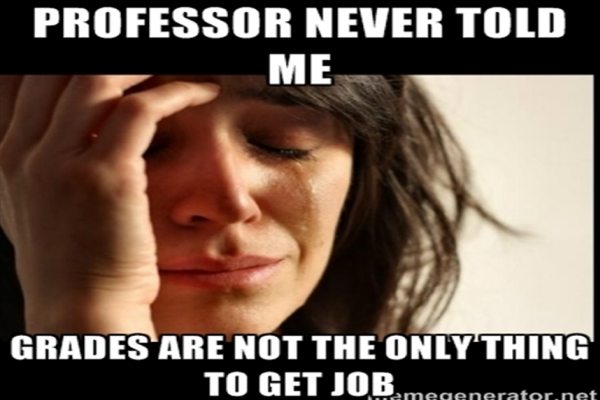Do you think you have gathered all the wisdom you could during your four years at college? Think again. You still haven’t learned what the real world has in store for you. Professors can give you an in-depth knowledge on countless topics, but you are likely to miss out on the following lessons:
Grades aren’t everything
Yes that’s right. Grades may be one of the things that will help you get that interview call. But grades aren’t everything. Learning is! It is your skills and what you actually gathered from every course that really matters. If you have a string of A grades on your transcript but you can’t recall basic concepts, you are headed for trouble.
Besides, having a well rounded personality, which includes above average grades, extra-curricular activities, community involvement, right amount of fun, and socializing can help you succeed in the real world. Remember, that classroom is not the only place where you learn, learning is just about everywhere. Good grades can’t possibly make up for what you didn’t learn in other areas of life.
Be nice to everyone and make contacts
The more people you know and the more agreeable you are as a person, the more chances you will get to succeed in the real world. Sometimes who you know can be much more important than what you know. Many people can become your source of job opportunities. People may give you that much needed career advice, tell you about rewarding job opportunities, or even refer you in their organization. With your likeable attitude and outgoing personality, you are likely to avail opportunities that others miss out on.
Experience is as important as education
It is true that many people are unable to succeed in their professional lives because they lack education, but this does not prove that education is everything. Education makes it easier for you to succeed, but experience also counts a lot. With experience, you learn hands on skills that education may fail to provide. You acquire invaluable skills in the real world experience that classroom settings cannot provide. The right mix of education and experience is what you need to excel in your career.
You’ll excel at what you love
In the pursuit of good grades and lucrative careers, this important lesson is usually lost. Remember, that work will take up most of your time once you graduate. If you don’t do something with your heart in it, it is likely that you will not excel at it. You don’t just need the right education and skills to succeed in something; you also need the will. If you don’t enjoy your work, you might just end up working at a minimum acceptable level, and that won’t take you far in your career. In order to succeed, you will need to find out what you love, and do exactly that!
You already have a brand
You are not like any other classmates you had in your college. You already have a brand of your own. The way you speak, dress up, and interact with people makes you different. Your interests, social media presence, and your unique talents also make an impact. All these things define you. It is possible that the only thing you might have in common with your classmates is the college degree. You create your own opportunities, based on the person you are. Find out your core strengths, offer a unique proposition to the world, and capitalize on your talents!
Here were the five important lessons your professor didn’t tell you about. Do you also have something from the real world that you would like us to know? Feel free to share your insights, comments, and also what you disagree with.
You May Also Like
How Long Does it Take to Become a Welder?
How to Become a Welder Inspector
Steps to Become a Welder
How to Get into Pipeline Welding









Comments are closed.